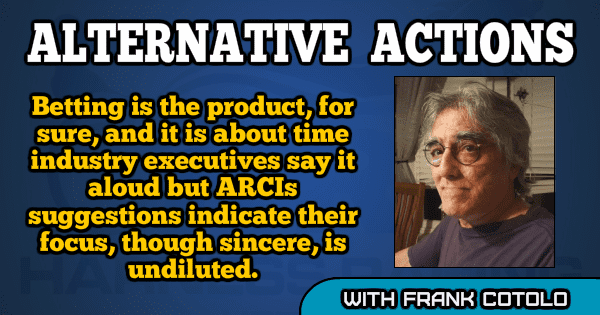Alternative Actions: Part 1 – Racing commissioners focus on betting product and ignore the plight of the patron
by Frank Cotolo
Due to the nature of this month’s topics, we will use two columns for our commentary. Here is part one:
In early April, the Association of Racing Commissioners International’s (ARCI) annual Conference on Equine Welfare and Racing Integrity addressed making “better use of technology to create betting products and experiences” so that pari-mutuel horse racing may attract more business and compete in a crowded gaming market.
Speakers’ themes were similar to some in “Alternative Actions” columns at HRU. For instance, J. Curtis Linnell, Thoroughbred Racing Protective Bureau’s executive VP, said, “Betting is the juncture in which the marketplace comes to horse racing. That is where participation by the customer happens.” Similar, however, is not a bull’s-eye.
Betting is the product, for sure, and it is about time industry executives say it aloud but ARCI’s suggestions indicate their focus, though sincere, is undiluted. There was no mention of the bettors, just talk about the means in which they bet.
Consider comments from Sean Pinsonneault, a former executive VP of strategy and wagering for the Woodbine Entertainment Group. He credited the creation of “jackpot wagers” over the past decade as a way the sport created betting excitement. I see where it can be construed that jackpot wagers (carryover creations) pumped up industry profits. However, they have not been in the best interest of pari-mutuels’ major audience. Those bets, in other words, do not favor the common bettor, nor is there any evidence they create new patrons.
It’s an old argument I could easily start again. That jackpot solution is merely “lottery mentality,” a gimmick in which a track administration lures more people to bet on a race or races in the hopes of becoming the largest — if not only — beneficiary of a huge pot.
Regular patrons play the jackpots, sure, but the bulk of the money bet on them comes from groups of investors with no loyalty to the sport or a single track or, in fact, horse racing in general. A big-bankroll entity is the common benefactor and once that entity hits the jackpot, off it goes like a thief in the night to find other jackpots favoring the richest investors.
Meanwhile, the bread-and-butter bettors are tossed scraps. Once in a while a few of them become lucky (their skills commingle with their good fortune) and they make a decent score. Those few, however, won’t be running off to other venues with their bankroll. They will continue to assist in the churn of wagering at their favorite tracks, on site or online, and they will continue to struggle with the grind of making a profit. Hopefully, they won’t lose all of their jackpot winnings on other jackpot events.
Be sure of this: there is no room for lottery mentality in pari-mutuel play. Jackpot wagers suck precious dollars from devoted bettors who would otherwise be spreading their bucks out on other races. There, too, however, certain betting products, specifically exotics, conjoin to benefit the handle and not most of a raceway’s steadfast customers.
But that’s why the dirt-cheap single- and multi-race exotics were created, right? So bettors who regularly put smaller wagers across the windows can accept the illusion of making a lot from betting a little. The ten- and twenty- and fifty-cents exotic pools are not graced with the presence of the big dollars from fair-weather jackpot entities. They’re gone until the next heaping jackpot is available. Besides, the cheap exotic pots are low and not jackpot-worthy. Payoffs for those cheesy products, basically, suck because, simply, cheaper wagering products produce cheaper returns. The bettor receives no bargains out of being able to construct a $36 Pick-3, -4, -5 or -6 ticket from a base bet of 20 cents when it returns enough to break even or hand over a puny profit.
A bettor’s basic dream of striking it rich with a single bet is the raw meat of lottery mentality. Casinos use it with jackpots in slot machines, knowing people relentlessly aim at the biggest promised returns rather than accept what profits they are apt to make along the way. That is usury, that is taking total advantage of the customer and it does not assist in any success they want. It is counter-productive and it shouldn’t be which can be racetrack policy.
I have come in contact with thousands of gamblers over the years on this continent and others and am yet to meet a single middle- or lower-class player who does not walk away bitter when losing a jackpot wager. The odds of such bets favor gargantuan combination tickets filled with hundreds of losing numbers, a process unavailable to the track’s important customers, the regulars, those who love to gamble on horse racing.
What does that say about how racetrack management treats the body patron?
Nothing good, I assure you.

















